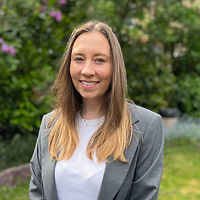
Get to Know Kate
Learn more about Kate Mills, a highly skilled Speech and Language Therapist with a strong background in supporting children and young people with a wide range of Speech, Language, and Communication Needs (SLCNs). Discover Kate’s experience and journey, both within her Speech and Language Therapy career and in her early professional life.
Kate Mills:
Background

Kate Mills is a highly specialist Speech and Language Therapist based in South West London, with a commitment to supporting children and young people with a variety of Speech, Language, and Communication Needs (SLCNs). She began her professional journey with a 2:1 BA (Hons) in Childhood Studies from Sheffield Hallam University. During her time as a Nursery Teacher for two years, Kate discovered her passion for Speech and Language Therapy, particularly in supporting children with developmental language needs.
Kate went on to complete an MSc in Speech and Language Therapy at City, University of London, graduating with distinction in 2020. Since then, she has been working in the NHS, progressing from a Newly Qualified SLT to a Highly Specialist SLT. Her clinical experience spans a variety of settings, including mainstream schools, clinics, children’s centres, and resource base teams.
Currently, Kate works with children aged 2 to 6 years in a resource base setting, supporting those with social communication differences and language difficulties, as well as within the Early Help Team for younger children (under 2.6 years old).
Kate’s experience includes working with a wide range of SLCNs, such as:
-
Speech sound disorders
-
Language delays / disorders
-
Social communication difficulties
-
Selective mutism
-
Autism
-
Global Developmental Delay (GDD)
-
ADHD
-
Down Syndrome
-
Cerebral Palsy and more.
Kate specialises in early years social communication and autism. She is an NLA-trained SLT through Meaningful Speech and has a particular passion for supporting children who communicate through echolalia. Kate’s approach focuses on understanding each child’s unique communication style, providing therapy that is both effective and respectful of their individual needs.
Kate specialises in supporting children and young people (early years-primary school age) with the following areas of need:
-
Social communication differences
-
Autism
-
Gestalt Language Processing (GLP)
-
Neurodiversity Affirming Practice
-
Developmental Language Disorder (DLD)
-
Language delay/late talkers
-
Selective Mutism
-
Speech Sound Disorders
-
Global Developmental Delay (GDD)
-
and more...
Kate does not specialise in the following primary areas of need:
-
Stammering
-
Dysphagia (Swallowing difficulties)
-
Hearing Loss
*If your child presents with any of these needs and it is not their primary need, she may still be able to provide support.
Who Can Kate See?
How Kate Found Her Specialisms
Kate’s career in Speech and Language Therapy began with a strong foundation in early childhood development through her role as a Nursery Teacher. This experience reinforced her belief in the importance of early intervention, showing how early support can make a lasting impact on a child’s development.
When Kate first began working with autistic children, she encountered traditional, compliance-based therapies that focused on shaping behaviour in a very structured way. While these methods are research-backed, she quickly realised they weren’t always suitable for neurodivergent children. This led her to explore more child-led, play-based approaches that value a child’s natural communication style.
Embracing this more flexible and intuitive way of working transformed Kate’s practice. She now offers therapy that is respectful of each child’s individuality while fostering a safe, fun, and supportive environment. This child-centered approach has allowed her to support neurodivergent children and young people in a way that feels both effective and authentic to their unique needs.